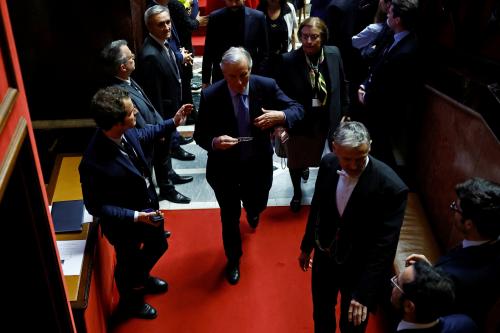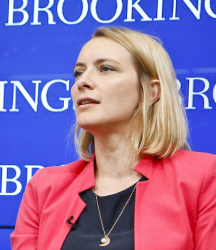

11:00 am EDT - 12:30 pm EDT
Past Event
On June 8, the Center on the United States and Europe at Brookings held its 17th annual Raymond Aron Lecture, featuring Thomas Gomart, a French historian of international relations and the director of the French Institute on International Relations (IFRI) in Paris. In his address, Gomart discussed the implications of Russia’s invasion of Ukraine for France and the global order more broadly. Following his remarks, Brookings Senior Fellow Fiona Hill responded. Interim Director of CUSE Célia Belin and French Ambassador to the United States Philippe Étienne provided welcome remarks. Belin also moderated the discussion. After the program, panelists took audience questions.
Gomart began by framing the conflict through four bilateral relations. Firstly, he considered the relationship between China and the United States, which he described as structural to the global order. Most pertinent, according to Gomart, were the lessons China is learning in view of a hypothetical invasion of Taiwan through its observation of the global and Western responses to Ukraine. Next, Gomart considered Russia-European Union relations, especially with respect to the massive upheaval implied by Europe’s energy decoupling from Russia. Thirdly, he assessed Russia’s relationship with China, noting that while ties between these two countries seem to be tightening, they are becoming more differentiated in their global positioning. While Russia is increasingly isolated from Western economies and ever more reliant on Chinese markets, China remains deeply integrated in the global economy. Finally, Gomart examined U.S.-European relations, offering counterfactuals to the current situation, including what might have happened if the U.S. hadn’t provided military assistance to Ukraine, but also what might have happened if former President Donald Trump had been in office at the time of the invasion.
In the second part of his lecture, Gomart offered three ways to frame the war in Ukraine. Firstly, he argued that the war is colonial in nature and punctuated by Russia’s nuclear capabilities. Adding credibility to both the colonial and nuclear aspects, he argued, is Russia’s history of violence under President Vladimir Putin. Gomart proceeded to propose a global, rather than European, framing of the war in Ukraine. This position, he continued, could be justified by Russia’s history of military, cyber, and special operations in non-European contexts such as Mali and Syria. Finally, Gomart examined the war from the perspective of French relations with Russia, considering both the historical ties between the two countries, and the reignited debate within French foreign policy spheres about whether close economic relations between France and Russia are the key to fostering cooperative, rather than competitive relations. Regarding this debate, Gomart predicted that economic decoupling would not alter Putin’s bellicosity whilst reminding the audience that Russia “will continue to be on the European continent where Ukraine has the right to exist by itself.” In light of the difficulty of the situation, Gomart advocated for pragmatism while quoting Aron: “In politics, the choice is not between the good and the evil, but rather between what is preferable or detestable.”
Hill agreed on the profound loss of Europe’s greatest competitive advantage: peace. She also concurred with Gomart’s emphasis on Europe’s newfound energy insecurity — a result of decoupling from Russia, an energy partner of six decades. Hill then moved to a discussion of the war as it exists within a uniquely Russian construct of history. She argued that Putin, in his role as “historian-in-chief,” has bolstered a discourse that transforms Russia’s victory in World War II into something of a state religion, while simultaneously framing Ukraine as an illegitimate political entity with cultural, spiritual, and historical roots in Russia. Hill then drew a causal link between Putin’s historical revisionism and the global community’s unwillingness to condemn Russia’s invasion of Ukraine, making clear that the efficacy of Putin’s narratives extends far beyond Russia’s political borders. Accordingly, she appealed for greater attention to be paid to Western messaging and for a reframing of the war as one of colonial aggression, echoing Gomart’s argument in his lecture.
Before turning to audience questions, Gomart acknowledged the Anglo-American view of France as a somewhat unreliable partner on Russia, especially in light of the de Gaulle era. Yet, he framed France’s relative willingness to engage with Russia as a symptom of sharing a landmass with the military power — something that is not true for the U.K. or the U.S. Most importantly, Gomart asserted that despite France’s occasional deviation from Anglo-American policy towards Russia, France has always stood firmly in line with its partners in the face of major crises such as the war in Ukraine.
Audience members inquired about the strengthening the Sino-Russian partnership and what the West might do to interrupt this partnership. Hill responded that Sino-Russian partnership would require “a 360-degree perspective… on European security and on trans-Atlantic relations,” and that the Russian invasion of Ukraine could serve to embolden Chinese aggression against Taiwan. She further added that engaging with China on the integrity of borders — a norm that they have historically endorsed — might be a way to mitigate the effects of Russia-China partnership, if not to weaken it by nature of Russia’s flagrant disregard for this norm. Gomart, for his part, added that it was not only important to consider the Sino-Russian partnership, but also the increasing solidarity amongst members of the Shanghai Cooperation Organisation at large. Furthermore, Gomart reminded the audience of previous attempts to form a “triangle” between Delhi, Beijing, and Moscow. To this effect, he recommended the development of a framework for “for future discussion” on Asia, which he designated the “rising continent.”

Moderator


Tara Varma, Caroline Grassmuck
December 13, 2024

Andrew W. Wyckoff
September 20, 2024
2024
Online Only
Monday, 1:30 pm - 2:30 pm EDT